This page provides general information about the Research Support Fund (RSF) program at Simon Fraser University. Detailed information about SFU's RSF processes are available on the internal RSF web page for staff and faculty (SFU log-in is required; please use your personal SFU account as role accounts may not allow for access to this page).
On this page:
- What is the Research Support Fund?
- What are Incremental Project Grants (IPG)?
- What is the Research Security stream of IPG?
- What are the indirect costs of research?
- How is the RSF allocated at SFU?
- Affiliated hospitals and health institutes
- RSF and IPG spending, objectives, indicators and outcomes
- RSF impact on SFU research
- Resources
What is the Research Support Fund?
Canada's Research Support Fund (RSF) assists postsecondary institutions with the costs associated with managing their research enterprise. This helps the institutions maintain a world-class research environment, thereby helping make Canada a world leader in research and development. RSF grants can be used to maintain modern labs and equipment; provide access to up-to-date knowledge resources; provide research management and administrative support; meet regulatory and ethical standards; or transfer knowledge from academia to the private, public, and not-for-profit sectors.
What are Incremental Project Grants?
The Incremental Project Grants (IPG) funding opportunity is a stream of RSF. IPG provides funding, in addition to an institution’s RSF grant, which provides additional support to the indirect costs of research. To receive IPG funds, an eligible institution must submit an application for specific projects. These projects must fit within a group of priorities that cut across RSF’s five existing categories of eligible expenses. IPG's initial four priority areas are: innovation and commercialization activities; facilities renewal, including deferred maintenance; information resources, including digital resources, open access and databases; and equity, diversity and faculty renewal (in the context of equity, diversity, and inclusion).
What is the Research Security stream of IPG?
Starting in FY22-23, a Research Security stream was added to IPG to provide institutions with funding to support the indirect costs of research security and to support the National Security Guidelines for Research Partnership. This funding stream will provide institutions across Canada a collective total of $125 million over five years. Research Security is considered a fifth priority area of the IPG program, and enables institutions to build capacity to identify, assess and mitigate potential threats to research security.
What are the indirect costs of research?
RSF and IPG support the indirect costs of research, which are the “hidden” costs that are incurred in the support of research-related activities that cannot be easily attributed to a specific research project.
At Simon Fraser University, the indirect costs of research include:
- Maintaining high quality research infrastructure through the renovation and maintenance of research facilities, upgrades to equipment and the operating costs of research space;
- Providing in-house technical expertise for ongoing and daily support to research facilities;
- Acquiring research resources including library holdings and datasets;
- Facilitating research through institutional support for the completion of grant applications and proposals, financial administration and reporting, and research planning and promotion;
- Ensuring the requirements of regulatory bodies are met, including the Tri-Council & Canadian Council on Animal Care;
- Managing the licensing of university technologies.
How is the RSF allocated at SFU?
Breakdowns showing how SFU has spent its RSF among the five RSF expenditure categories and four IPG priority areas can be found in the RSF and IPG Spending, Objectives, Indicators, and Outcomes section below.
At SFU, RSF is generally divided between the university and the initiating faculty, as is the case with overheads realized from research funded through contracts. The initiating faculties report each year on the use of these RSF funds, so that SFU can fulfill reporting requirements.
Additional details about internal SFU RSF processes and allocations are available on the SFU Internal RSF Program webpage (SFU staff or faculty login required).
Affiliated Hospitals or Health Institutes
The following Health Institutes are considered SFU’s affiliates for RSF grants:
Note: we have listed only those affiliates for which affiliation agreements have been executed. We have not listed any health institutes for which affiliation agreements are still being negotiated.
RSF and IPG Spending, Objectives, Indicators, and Outcomes
In 2023-2024, SFU expects to receive $7,057,937 in RSF grants, $1,049,546.00 in general IPG funding, and $464,411 in Research Security IPG funding. The charts and linked PDF below outline how SFU intends to use these funds.
RSF 2023 - 2024
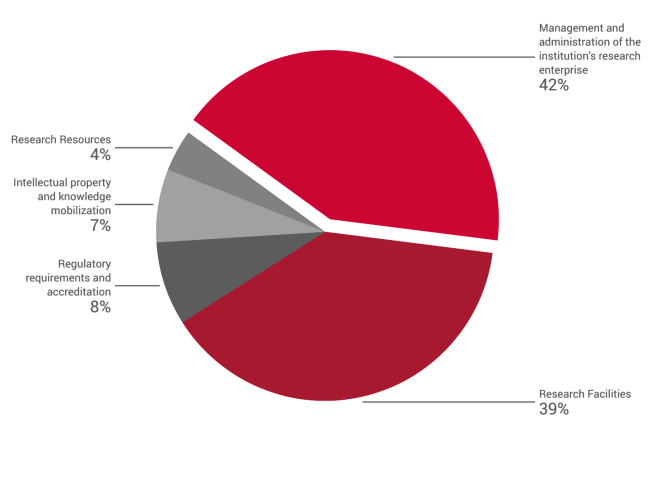
IPG 2023 - 2024
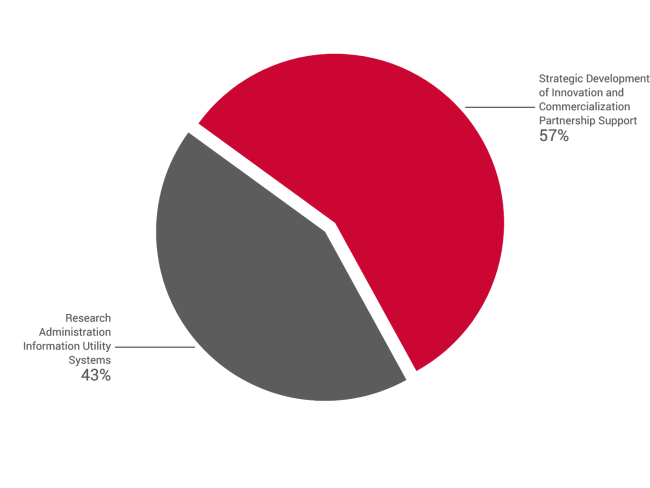
* For IPG, $450,000 is intended for SFU's Research Administration Information Utility Systems and $599,546 is intended for strategic development of innovation and commercialization partnership support. All $464,411 of the Research Security funds are intended to be used for capacity and structure development.
View the details of RSF, IPG, and Research Security objectives, indicators, and targeted outcomes (.pdf)
In 2022-2023, SFU received $7,221,790 in RSF grants, and $1,078,709 in IPG funds, and an additional $477,405 in Research Security funds. The charts and linked PDF below outline how SFU used these funds.
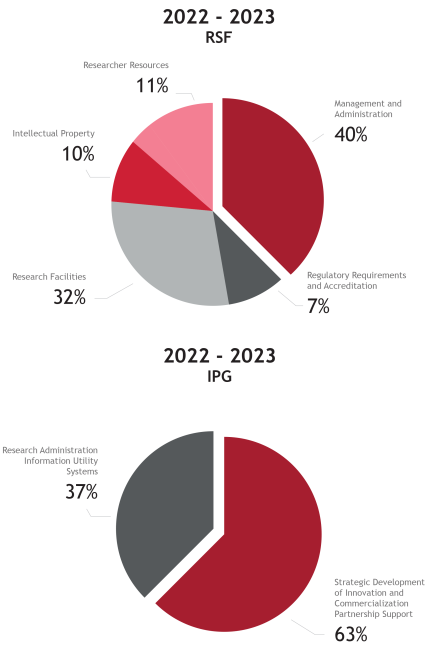
* For IPG, $400,000 was spent on SFU's Research Administration Information Utility Systems and $678,709 was spent on strategic development of innovation and commercialization partnership support. All $477,405 of the Research Security funds were used for capacity and structure development. Details of RSF, IPG, and Research Security objectives, indicators, and targeted outcomes are outlined here (.pdf).
In 2021-2022, SFU received $7,487,450 in RSF grants and $1,132,552 in IPG funding. The charts below outline how SFU used these funds.
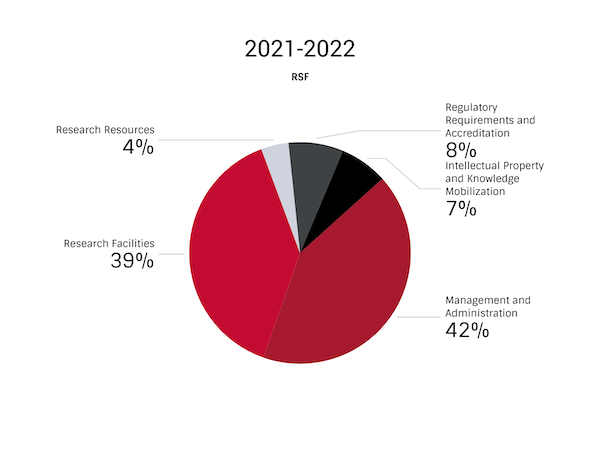
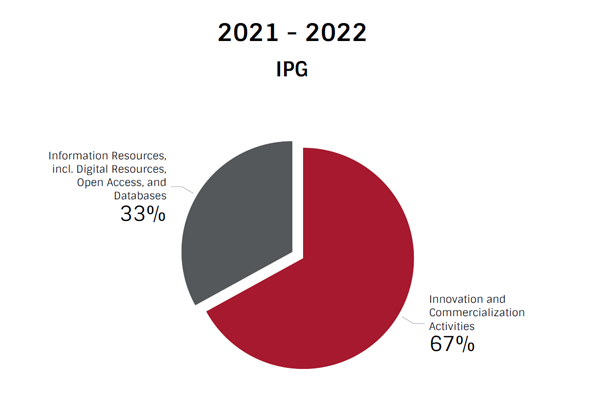
* For IPG, $370,000 was spent on SFU's Research Administration Information Utility Systems and $762,552 was spent on strategic development of innovation and commercialization partnership support.
Details of RSF & IPG objectives, indicators, and targeted outcomes and reported outcomes are outlined here (pdf).
In 2020-2021, SFU received $7,242,096 in RSF grants and $915,961 in IPG funding. See the charts below outlining how SFU allocated these funds.
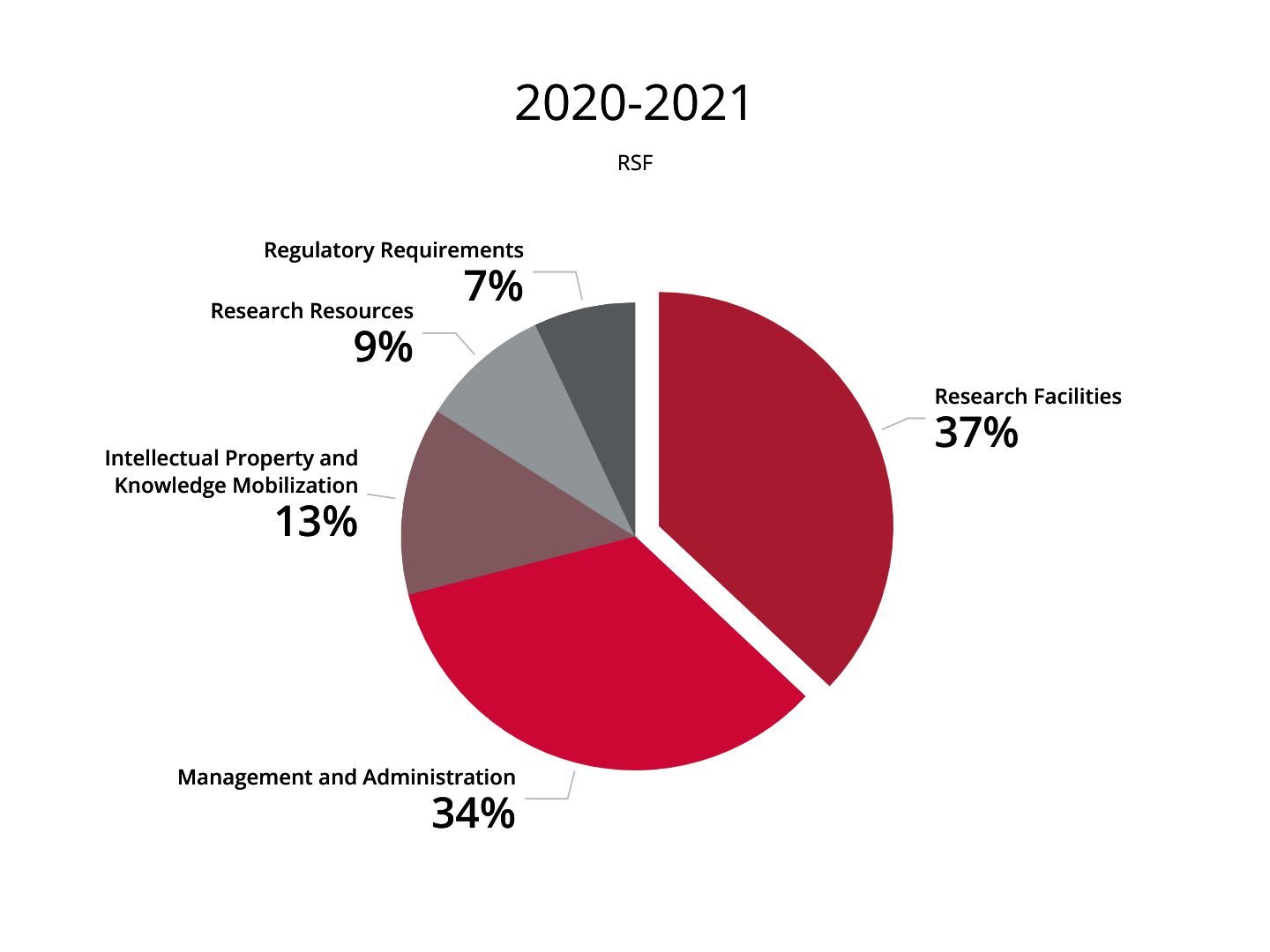
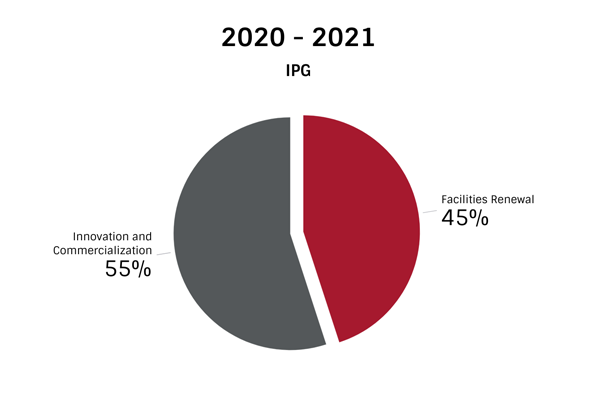
* For IPG, $207,980 was used for 4D LABS Service Expansion, $132,981 was used for ImageTech Lab, $75,000 was used for the CL3 Lab, and $500,000 was used for the Strategic Partnerships Hub.
Details of RSF & IPG objectives, indicators, targeted outcomes and reported outcomes are outlined here (pdf).
SFU received a RSF grant (excluding IPG) of $7,842,200 and $783,640 in IPG funds in fiscal year 2019-2020.
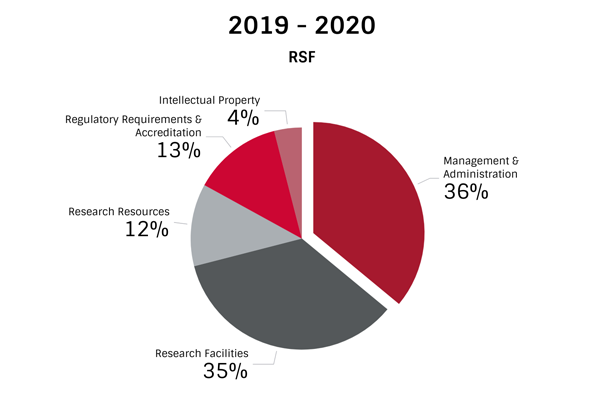
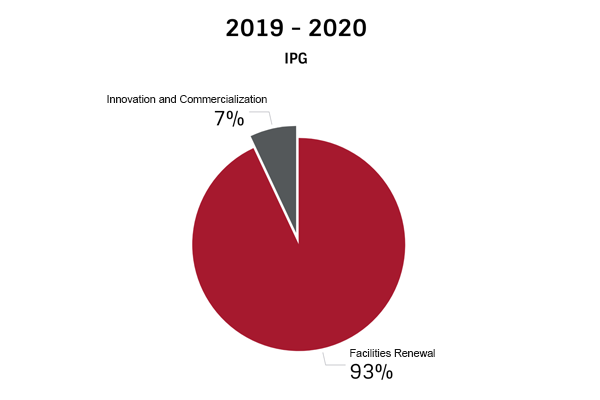
* For IPG, $227,000 was spent on 4D Labs Service Expansion; $500,000 was spent on the ImageTech Lab Facility; and $56,640 was spent on Surrey City Centre Innovation Services.
Details of RSF & IPG objectives, indicators, targeted outcomes and reported outcomes are outlined here (pdf).
SFU received a total RSF grant (excluding IPG) of $8,112,810 in 2019. SFU received a total of $618,959 of IPG funding. Spending was broken down as follows:
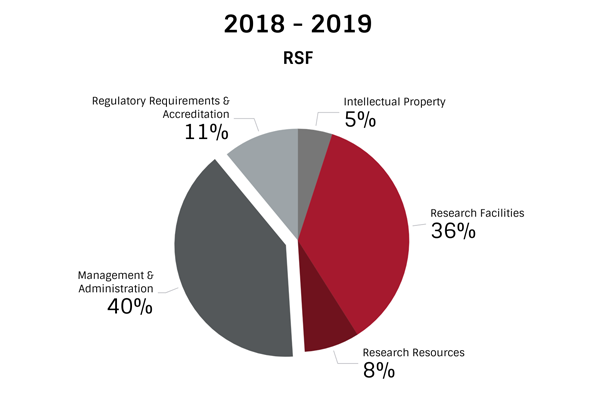
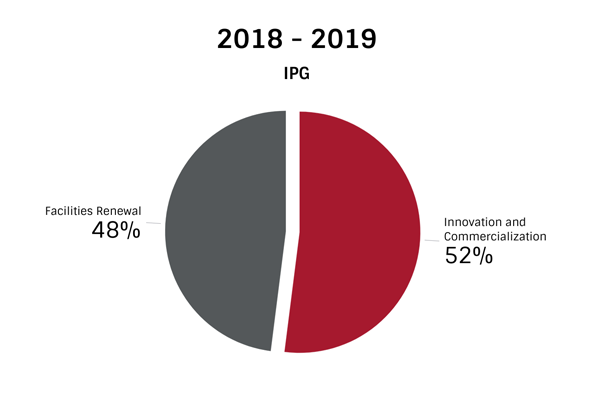
* For IPG spending, $318,959 was spent on Technology Transfer and Commercialization and $300,000 was spent on Core Facilities.
Details of RSF and IPG objectives, indicators, targeted outcomes and reported outcomes are outlined here (pdf).
What impact has the RSF had on SFU research?
The RSF contributes to SFU's ability to provide a supportive research environment through the provision of staff and services that allow researchers to pursue their research programs and seek new funding opportunities. It also enables SFU to provide research facilities and other resources that help to attract and retain high-calibre researchers and graduate students. In turn, the presence of leading researchers and highly qualified personnel ensures SFU's continued participation in major, multi-institutional and international research initiatives.
Progress towards RSF objectives: Overall impacts
Aligning with the university's institutional strategic plan and its core values, SFU’s 2023-2028 Strategic Research Plan (SRP) captures some of the breadth of activities at the university while identifying areas of research strength and focus for that time period. It is accompanied by an implementation plan that identifies specific actions that will be taken to support and enhance the impact of the university in these priority areas.
SFU is a comprehensive research university, with research and other scholarly activity spanning a wide range of disciplines and approaches. Each of the priority areas identified in the SRP spans multiple disciplines. As an academic institution we are committed to building multi-disciplinary communities of practice in these areas. We also note that these priority areas intersect with each other and that some of the most interesting research happens at those intersections.
Learn more about SFU's SRP and its implementation plan at sfu.ca/strategic-research-plan.
SFU is among Canada's fastest growing research intensive universities measured by growth of research income. Our sponsored research income has grown by 37.5% over the past 10 years, reaching $141.1 million in 2022.
SFU continues to be the top ranked university among Canadian comprehensive universities in the Maclean’s annual university rankings. The 2023 World University Rankings for Innovation (WURI) placed SFU as Canada's top university for innovation and industrial application, as well as number two in the world for entrepreneurial spirit. The 2023 Times Higher Education's Impact Rankings place SFU number one for its global impact on sustainable cities and communities—and fifth in the world for its response on climate action. These achievements have positioned the university to attain national and international leadership in a number of research areas.
Learn more about SFU's research performance and metrics.
Facilities
Approximately one-tenth of SFU's main campus space is used for research activities. With the support of the RSF, SFU can maintain modern, safe facilities that enable its researchers to keep up with changes in techniques and methodologies in their fields. The state of the university's research facilities impacts SFU's ability to participate in regional, national, and international research collaborations and to attract industrial partnerships. It is also a factor in the institution's ability to attract top faculty and students, and raise its research profile.
Without this support, SFU would be unable to maximize its return on external investment by maintaining the cleanliness, safety and efficiency of its research infrastructure, which are the foundations upon which research discoveries are made.
The major cost drivers in this category are the internal costs for labour (salaries and benefits) and the costs of parts and materials. The maintenance and operating costs associated with research space is about 50% higher than the average cost for the university. The RSF supports only a small portion of the SFU's total facilities costs.
Renovation and development of research facilities
BIO3 Lab
SFU's BIO3 Lab is one of a few biosecure facilities in Canada that are certified by the Public Health Agency of Canada. BIO3 stands for biocontainment for infections organisms, level three. Researchers can safely conduct infectious disease research on Risk Group 3 pathogens to help advance breakthrough discoveries. Since it opened in 2020, while SFU researchers have been safely working on better understanding SARS-CoV-2 and how it causes COVID-19, the lab now welcomes all SFU researchers working on other diseases related to Risk Group 3 pathogens. The facility is the first-of-its-kind at SFU and is in part possible because of RSF support.
Read the SFU News story
Read the story on SFU's Faculty & Staff Dashboard
Resources
Support from the RSF provides SFU researchers with the tools and informational resources necessary to carry out their research programs. These include library resources, software and other digital tools, computing and network infrastructure, and research data sets. The accessibility of these resources allows SFU to participate in the global 24/7-research environment.
The major cost driver in this category are the fees charged by external providers for these resources.
Research Funding and Award Opportunities Database
With help from the RSF, SFU continues to improve upon the Research Funding and Award Opportunities Database, containing the details of over 450 research grant and faculty award opportunities. The database is continuously updated and expanded by SFU's Office of Research Services staff.
SFU's Research Expertise Engine
RSF supports SFU’s Research Expertise Engine (REE), which is a database that has over 46,000 titles authored by SFU researchers, searchable by keyword, author, department or faculty. It helps SFU researchers connect to colleagues with similar interests, or with whom new multidisciplinary collaborations can be built; helps researchers and graduate students from other institutions find SFU researchers and SFU research works; and allows industry, government, partners and media to search for SFU scholars and research interests.
Management and Administration
Investment in research support through the RSF is vital to maintaining the smooth operation of SFU's research enterprise. It maximizes return on external investment by freeing faculty members to focus their time and effort on research.
The major cost drivers in this category are annual step progressions, negotiated salary increases and benefit costs. Salary costs overall increase annually even when the number of positions remains the same.
Without RSF support, researchers would need to spend more time on management and administrative tasks, which would negatively impact their individual research output as well as SFU's overall research productivity and competitiveness.
Institutional Support for Researchers:
Institutional Strategic Awards
SFU's Institutional Strategic Awards (ISA) team strives to increase success, reduce administrative burden and make it possible for the university and SFU faculty members to successfully compete for the most significant and prestigious grants, prizes and awards available. RSF supports with funding for ISA staff with the mission of supporting SFU researchers to increase their success for grants, prizes and awards, and therefore contributing to the university's excellent research reputation.
Read the SFU News story
Regulatory Requirements
SFU is in compliance with the Tri-Council Policy Statement on the Ethical Conduct for Research involving human subjects and the use of hazardous materials, as well as the policies of the Canadian Council on Animal Care (CCAC). The RSF supports the salaries of staff members who work to ensure SFU's continued compliance with regulatory requirements.
The expansion of SFU's research enterprise in recent years has created a substantial increase in workload for these positions. Without such support, SFU would be unable to keep up with this increased demand, and SFU's ability to meet regulatory requirements would be compromised.
The major cost drivers in this category are annual step progressions, negotiated salary increases and benefit costs. Salary costs overall increase annually even when the number of positions remains the same
Creation and Support of Regulatory Bodies:
Research Ethics
SFU's Research Ethics team upholds the highest ethical and regulatory standards of research involving human participants. Research Ethics supports researchers through the ethics review process, from the preparation of a new submission to continuing review of ongoing research. The team educates researchers in the policies and process of research ethics and ethics review and facilitates the review process conducted by the SFU Research Ethics Board and its subcommittees.
Technical Support for Animal Care
There are strict guidelines and policies in place to ensure the health and humane treatment of all animals used in research and teaching at SFU The same standards apply to all field studies as well. These standards are specified by a national agency, the Canadian Council on Animal Care (CCAC), as well as the university’s own policies, such as SFU Policy R20.03 Treatment of Animals in Research and Teaching, under the direction of the office of VP Research and the University Animal Care Committee (UACC).
In order to conduct research involving animals, SFU faculty members must submit an application to the UACC for approval. No research is conducted without this approval. All Animal Care Protocols are reviewed annually and researchers must re-apply every four years, for long term studies.
A portion of SFU's RSF is applied toward the salaries of the animal care staff, technicians and manager. Without the RSF support, animal research at SFU would be compromised and in many cases could not be performed. Without this support, the facilities and services for the proper and humane treatment of animals in our care would not function properly. In addition, this would affect the university's ability to maintain compliance with the Canadian regulatory standards for animal research.
Intellectual Property and Knowledge Mobilization
SFU's Technology Licensing Office (TLO) is focused on delivering intellectual property (IP) protection and technology licensing services and support.
The TLO supports faculty, graduate students and university researchers in the strategic management of the IP they generate through their inventions.
The major cost drivers in this category are annual step progressions, negotiated salary increases and benefit costs.
Technology Licensing Office
The RSF covers the salaries of staff within SFU’s Technology Licensing Office. These positions help SFU researchers build effective working relationships with communities, industry, governments, NGOs and non-profits to increase the solution capability of SFU innovators.
Read the story on SFU's Faculty & Staff Dashboard